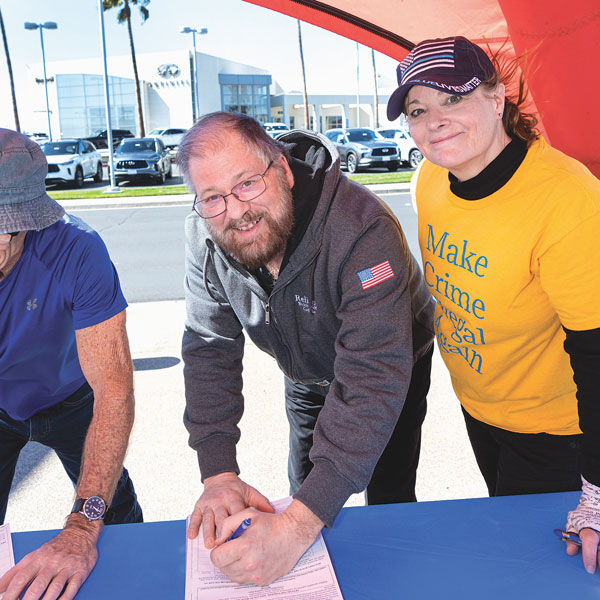A statewide signature-gathering effort is underway for a ballot measure to roll back provisions of California’s Proposition 47, which turned drug possession, drug trafficking and theft into misdemeanors.
If adopted by California voters next November, “The Homelessness, Drug Addiction, and Theft Reduction Act,” or “Fix Prop. 47,” would give prosecutors discretion to charge drug addicts with a “treatment-mandated felony” after two drug convictions.
These are modest, necessary reforms to address drug trafficking, addiction and theft plaguing California.
The problems began with the passage of Proposition 47 in 2014. Looking back, it’s hard to believe authorities allowed the ballot initiative to appear under the misleading title, “The Safe Neighborhoods and Schools Act.”

The results were the opposite. Pharmacies now display merchandise in locked cases. Dishwasher pods, shaving cream, even shampoo bottles are locked up to discourage shoplifting.
Business.org found a 54% increase in shoplifting among 700 small businesses, with 23% saying it happens daily. A National Retail Federation survey found organized crime in 2020 cost an average of more than $700,000 per $1 billion in sales.
With thieves walking in and helping themselves, a store owner or clerk can’t do anything, despite security cameras recording the attacks. Jobs already hard to fill become a scary way to earn a living.
Proposition 47 implemented three broad changes to felony sentencing. First, it reclassified certain theft and drug possession from felonies to misdemeanors.
Second, it authorized defendants serving sentences for felony offenses that would have qualified as misdemeanors under the proposition to petition for resentencing as a misdemeanor.
Third, it authorized defendants who completed sentences for felony convictions that would have qualified as misdemeanors to possibly reclassify those convictions as misdemeanors.
In practice, most misdemeanor (and often felony) thieves get away with their crimes. National retailers are targeted because expensive and confrontational loss-prevention strategies of the past no longer exist. It’s easier to write off losses. No wonder prices have risen.
Under the proposed new law, offenders charged with a “treatment-mandated felony” would have the option to complete a drug and mental health program or serve time in jail. After a fourth conviction, judges would have the option of sentencing the offender to jail or state prison.
The new act would increase penalties for drug dealers and allow judges to sentence dealers who possess firearms to state prison, rather than county jail. It would categorize non-prescription fentanyl as a hard drug and allow dealers who sell a fatal dose to be prosecuted for second-degree murder.
The new act would allow prosecutors to charge thieves with two prior misdemeanor theft convictions with a felony and possible jail sentence, regardless of value of the stolen property. A thief receiving a fourth conviction may be sent to prison.
For a thief arrested for multiple thefts, the value of the stolen property can be added together to exceed Proposition 47’s $950 limit, creating felony charges. The act provides increased penalties for thieves working together and thieves who steal or damage property valued at $50,000 or more.
For all these offenses, judges still have discretion to tailor punishment or treatment to individuals.
Local volunteers are collecting signatures of registered voters.
“I refuse to live in a society where crime is happening, and you just look the other way. That’s not how I raise my kids and how I want to live. This petition is the first, best chance to turn things back around,” says Kris Rogers, who gathers signatures in her Land Park neighborhood. “Our society can do better, and our kids deserve that.”
Statewide, 800,000 valid signatures must be submitted by the end of April. Polls show an overwhelming number of voters want the law modified. You can support this modification and still not be happy with high incarceration rates.
We have an opportunity on the November ballot to bring accountability and safety to our communities.
Visit casafecommunities.com for information and to sign the petition.
Cecily Hastings can be reached at publisher@insidepublications.com. Follow us on Facebook and Instagram: @insidesacramento.

















